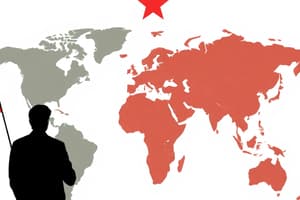Podcast
Questions and Answers
In Comparative Politics, which approach is used for an in-depth examination of specific countries?
In Comparative Politics, which approach is used for an in-depth examination of specific countries?
- Case studies (correct)
- Quantitative analysis
- Cross-national comparisons
- Regional analysis
Which of the following key concepts is NOT primarily associated with Political Theory?
Which of the following key concepts is NOT primarily associated with Political Theory?
- Global security (correct)
- Justice
- Liberty
- Authority
Realism, as a theory in International Relations, primarily emphasizes which of the following?
Realism, as a theory in International Relations, primarily emphasizes which of the following?
- Social constructs and identities
- Promotion of democracy
- Power and national interest (correct)
- Cooperation between states
Which stage in the public policy process involves the identification of societal issues?
Which stage in the public policy process involves the identification of societal issues?
What is the primary function of legislatures within political institutions?
What is the primary function of legislatures within political institutions?
Who among the following is associated with the social contract theory?
Who among the following is associated with the social contract theory?
Which key issue in International Relations focuses on the dynamics between nation-states and non-state actors?
Which key issue in International Relations focuses on the dynamics between nation-states and non-state actors?
Which philosopher is noted for their critical analysis of capitalism through the lens of class struggle?
Which philosopher is noted for their critical analysis of capitalism through the lens of class struggle?
Which key area of study in Comparative Politics seeks to distinguish between different electoral systems?
Which key area of study in Comparative Politics seeks to distinguish between different electoral systems?
What term describes the administrative arms of government that implement laws and policies?
What term describes the administrative arms of government that implement laws and policies?
Flashcards are hidden until you start studying
Study Notes
Political Science Overview
- Study of politics, government systems, and political behavior.
- Divided into several subfields for in-depth analysis.
Political Theory
- Definition: Examination of ideas, principles, and philosophies underpinning political systems.
- Key Concepts:
- Justice, power, authority, and liberty.
- Major political ideologies: liberalism, conservatism, socialism, anarchism.
International Relations
- Definition: Study of interactions between nation-states and non-state actors.
- Key Theories:
- Realism: Focus on power and national interest.
- Liberalism: Emphasis on cooperation, international organizations, and democracy.
- Constructivism: Importance of social constructs and identities.
- Key Issues:
- Global security, international conflict, trade relations, human rights.
Comparative Politics
- Definition: Analysis of different political systems and their functions.
- Key Approaches:
- Case studies: In-depth examination of specific countries or regions.
- Cross-national comparisons: Identifying patterns and variations.
- Key Areas of Study:
- Political regimes (democracies vs. autocracies).
- Electoral systems, political parties, and interest groups.
Political Institutions
- Definition: Structures that govern a society's political life.
- Key Types:
- Legislatures: Lawmaking bodies (e.g., parliaments, congresses).
- Executives: Administrative arms (e.g., presidents, prime ministers).
- Judiciaries: Court systems that interpret and apply laws.
- Functions:
- Establishing order, making laws, adjudicating disputes.
Public Policy
- Definition: Deliberate actions taken by government to address societal issues.
- Key Stages:
- Problem identification, policy formulation, implementation, evaluation.
- Areas of Focus:
- Economic policy, social welfare, healthcare, environmental policy.
Western Political Thought
- Historical Context: Evolution of political ideas from ancient Greece to modern times.
- Key Figures:
- Plato: Theory of Forms and ideal state.
- Aristotle: Empirical analysis of political systems and virtues.
- Machiavelli: Realism in politics and the idea of statecraft.
- John Locke: Social contract and natural rights.
- Karl Marx: Class struggle and critique of capitalism.
- John Stuart Mill: Liberty, utilitarianism, and individual rights.
- Key Concepts:
- Democracy, individualism, rights, and the role of the state.
Political Science Overview
- Focuses on politics, government systems, and political behavior.
- Analyzed through various subfields for specialized study.
Political Theory
- Investigates foundational ideas and philosophies of political systems.
- Key concepts include justice, power, authority, and liberty.
- Major ideologies:
- Liberalism: Emphasizes individual freedoms and market-based economies.
- Conservatism: Values tradition, social stability, and maintaining established institutions.
- Socialism: Advocates for social ownership and egalitarianism.
- Anarchism: Calls for a stateless society and rejects hierarchical authority.
International Relations
- Examines relationships between nation-states and non-state actors.
- Key theories explain behavior and interactions:
- Realism: Prioritizes power dynamics and national interests.
- Liberalism: Highlights cooperation among states through international organizations.
- Constructivism: Focuses on the role of social constructs and identities in international relations.
- Significant issues include global security, international conflicts, trade relations, and the protection of human rights.
Comparative Politics
- Studies and compares political systems globally.
- Key methodologies include:
- Case studies: In-depth focus on specific countries or regions.
- Cross-national comparisons: Identifying similarities and differences across systems.
- Concentrates on political regimes like democracies versus autocracies, electoral systems, political parties, and interest groups.
Political Institutions
- Represents the frameworks governing political life in a society.
- Primary types include:
- Legislatures: Bodies responsible for law-making (e.g., parliaments, congress).
- Executives: Administrative leaders such as presidents and prime ministers.
- Judiciaries: Court systems that interpret and enforce laws.
- Functions include establishing societal order, law-making, and resolving conflicts.
Public Policy
- Refers to intentional government actions aimed at resolving societal issues.
- Key stages in the policy process:
- Problem identification
- Policy formulation
- Implementation
- Evaluation
- Key focus areas involve economic policies, social welfare programs, healthcare initiatives, and environmental regulations.
Western Political Thought
- Chronicles the development of political ideas from ancient Greece through modernity.
- Notable thinkers include:
- Plato: Developed the Theory of Forms and envisioned an ideal state.
- Aristotle: Conducted empirical analysis of political systems and virtues.
- Machiavelli: Advocated realism in politics and effective statecraft.
- John Locke: Introduced the social contract theory and concepts of natural rights.
- Karl Marx: Critiqued capitalism and highlighted class struggles.
- John Stuart Mill: Focused on liberty, utilitarianism, and individual rights.
- Key concepts include democracy, individualism, rights, and the state's function.
Studying That Suits You
Use AI to generate personalized quizzes and flashcards to suit your learning preferences.



